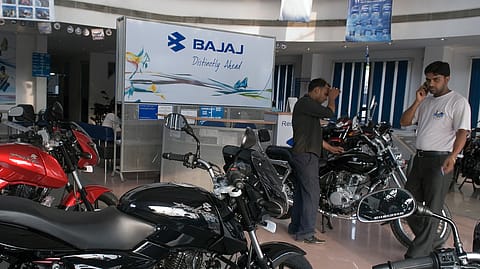Bajaj Auto shares jump 5% on rebound in exports
The company’s export business registered volumes of over 5 lakh units after almost nine quarters.

Shares of Bajaj Auto Ltd rose as much as 5% in intraday trade on Wednesday after the two-wheeler maker reported a rebound in exports business for the quarter ended December 31, 2024.
The company’s export business registered volumes of over 5 lakh units after almost nine quarters.
Reacting to the earnings, shares of Bajaj Auto opened at ₹8,450.85 against their previous closing price of ₹8,392.55 on the BSE. The stock gained 5% to hit a high of ₹8,803.70, taking the company's market cap to ₹2.41 lakh crore.
Standalone net profit of Bajaj Auto rose 3% year-on-year to ₹2,109 crore for the third quarter as against ₹2,042 core in the corresponding period a year ago.
Revenue from operations jumped 6% year-on-year to ₹12,807 crore aided by strong exports, a buoyant domestic electric vehicle and compressed natural gas (CNG) portfolio.
Recommended Stories
Exports stayed on its path of recovery across motorcycles and commercial vehicles, delivering double-digit revenue growth for the fourth successive quarter, the company says. Increased volumes in Africa, Asia and Latin America more than offset the significant drop in KTM exports, it says. LATAM continued on its strong growth trajectory as it reported yet another record quarter.
In Africa, the Nigerian market is one of the biggest markets for the Indian two-wheeler maker which recovered in Q3 after sluggish sales in the first two quarters. “Nigeria, which used to account for sales of 50,000 units each month, had gone down to 6,000 units in Q1 FY25. However, sales in the Nigerian market have recovered to 35,000 units in the third quarter,” says Bajaj Auto chief financial officer Dinesh Thapar.
(INR CR)
With Q3 margin coming in at 20.2%, the world’s most valuable two-wheeler company maintained its margin at the 20%-plus level.
Bajaj Auto’s electric vehicle business — which includes three-wheelers and e-scooters — delivered a marginal profit in the quarter ended December compared with a loss a year ago, according to the company's chief financial officer. This was aided by growth in electric three-wheelers business and the improving unit economics in electric scooters, a business which is yet to achieve profitability. “The bleed (on Chetak) has come off compared to a year ago. The rise of electric three-wheelers is creating a profit pool which is absorbing the losses of the Chetak portfolio,” says Thapar.
“We have a line of sight on getting the unit economics of Chetak profitable, subject to where market pricing of EVs will eventually be,” says Thapar.
Bajaj Auto had emerged as India top electric scooter maker in December 2024. The company trebled share in electric three-wheelers in the third quarter over last year. Bajaj Auto's electric vehicle and CNG vehicles contributed about 45% to domestic business revenues in the third quarter.
The company reported its highest-ever commercial Vehicles quarterly retails. Electric three-wheeler volumes surged 5x year-on-year, supported by an extended network from 600 to over 850 touchpoints.
The company added ₹3,000 crore of free cash flow in the first nine months of FY25.